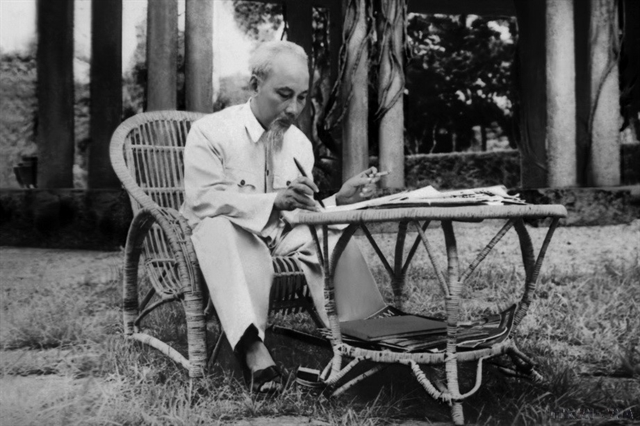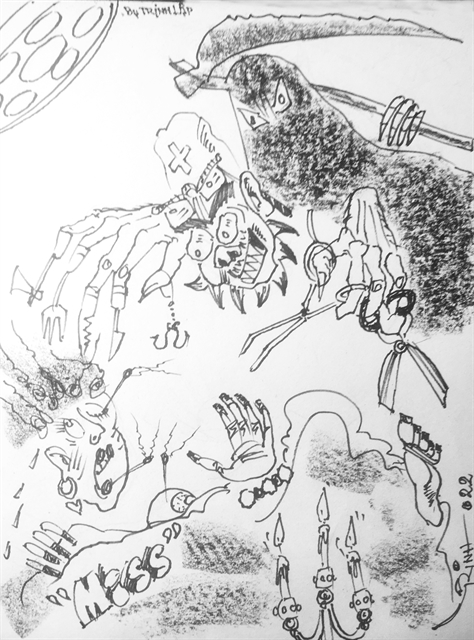 Talk Around Town
Talk Around Town

Amidst all the travails of the global pandemic that are said to have pushed people to a deeper outlook on life, I was surprised at a recent discovery: More and more millennials and generation Zs are getting into plastic surgery, ignoring or going beyond the “beauty is skin deep” adage.

|
| Illustration by Trịnh Lập |
By An Phương
Amidst all the travails of the global pandemic that are said to have pushed people to a deeper outlook on life, I was surprised at a recent discovery.
More and more millennials and generation Zs are getting into plastic surgery, ignoring or going beyond the “beauty is skin deep” adage.
In a recent discussion with some colleagues aged 22-30 who I have known for some time, I noticed that the general attitude towards getting plastic surgery had become more open and accepting.
In fact, two of them had undergone plastic surgery and had interesting stories to share.
Thanh Đan, 29, admitted that she used to view plastic surgery as taboo, but had undergone a change in attitude and was enjoying the results.
“I went for a breast augmentation three years ago and haven’t regretted it a single day. People, especially ones from older generations, have reservations about it, but the final decision is ours, we can choose to accept or ignore them,” Đan said.
Ngọc Anh, 22, is planning to get a “nose job” (rhinoplasty) next month after three years of savings.
“I didn’t want to ask for my parents’ money as they already have a negative impression about plastic surgery. Even though my mom has become more supportive of my decision and helped me find the best hospital to perform the procedure, there’s nothing I can do about my dad’s opinion,” she said.
The raison d'être for Đan and Anh to seek plastic surgery intervention is self-confidence. Completely legit, if you ask me.
However, I also think it is crucial to look at the bigger picture and determine several major factors that influence people’s consideration for cosmetic enhancements.
“Social media amplifies my insecurities about my appearance because photos from unflattering angles are available for me and everyone else to stare at,” said Tú Anh, 26.
“Especially with TikTok and Instagram where simple filters have shown how effortlessly one’s face can look prettier… with a little ‘touch up’… Sometimes, I’d like to look like that in real life…” she said, adding that with daily routines involving multiple selfies, Instagram filters and Zoom calls, it is hard not to scrutinise “every imperfection.”
In addition to social media pressures, the desire to stand out in the job market also drives some people to undergo plastic surgeries.
Some younger workers believe an improvement in their appearance will provide them with a leg up in the job market. Đan said she’d actually seen a case of her close friend not getting a frontline bank position, partially due to her appearance and resultant lack of confidence.
“Of course, it wasn’t my friend’s fault but the other candidate had a competitive edge in her looks!” she said, while acknowledging that while attractive appearance may not be decisive in a successful career success, it does offer an advantage in the journey.
With advancements, cosmetic surgeries now offer non-invasive and more accessible treatments that require very minimal downtime, which is perfect for those who thrive on instant gratification.
I have also realised that the ease with which a procedure can be done these days has also affected people’s attitudes towards plastic surgery.
Danh Tú, 30, told me that he recently had his lips filled after escorting his friend to a trusted medical clinic for a jaw botox.
“It was an unexpected move! I knew about lip fillers but had never thought of getting one. I just casually had a chat with the doctor while she was injecting botox to my friend’s jaw and the next thing I knew, I left the clinic with my lips filled,” he said.
Tú said he was pleased that the procedure was not painful and didn’t leave any noticeable marks. After several days of recovery, he told me he was proud of his impromptu decision.
I guess there is nothing wrong with trying to look our best, but I still have misgivings about how far we can go for the physical “transformation” that we seek.
Tú Anh shares my concern. “I know people who have become addicted to plastic surgery and as much as I respect their personal choices, I am worried about their health,” she said.
Recently, many local newspapers have reported deaths and unfortunate complications related to plastic surgeries at non-professional or quack facilities.
The influx of opportunistic doctors who are not certified plastic surgeons looking for a slice of this lucrative pie is alarming. Hence, it is crucial that people conduct thorough research about both procedures and medical facilities performing them.
Tú Anh put it well: “In pursuing some injectable procedures myself, I have tried to equip myself with the necessary knowledge. I would never risk my own health for the youthfulness that cannot last forever.” VNS




